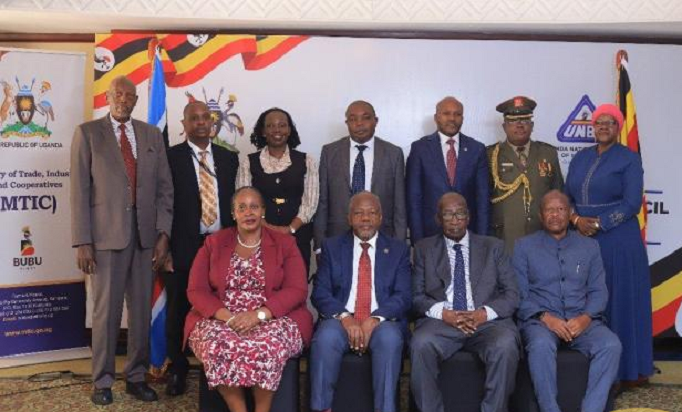Minister Mwebesa seated in dark blue tie, poses for photo with the new standards council members
The Minister of Trade, Industry and Cooperatives, Francis Mwebesa, has cautioned the Uganda National Bureau of Standards (UNBS) against punishing traders who are found selling counterfeit goods, but instead target the source of such items.
Speaking at the installation of the 10th National Standards Council, Mwebesa emphasised the need for the Bureau and its enforcement arms to focus on supporting traders and manufacturers rather than intimidating them.
“We are not inspectors or police,” Mwebesa declared. “We are here to serve the public, to guide, not to harass businesses. That policing is what breeds corruption.”
The Minister recounted his experiences in the private sector, lamenting the fear that sweeps through business communities whenever UNBS enforcement teams are deployed.
“One day it’s supermarkets being closed, the next day it’s factories. This must change. Go to the source, factories and importers, not traders who are the last point of sale,” he said, stressing the importance of tackling quality issues at the production and importation level.
He defended traders, stating that they are the country’s major taxpayers and essential to the economic engine. “Many people think investors are better than traders. I disagree. Traders pay more tax and are critical to economic circulation. You cannot manufacture and expect the government to collect tax unless someone sells it,” he noted.
State Minister for Trade, Industry and Cooperatives, Gen. Wilson Mbadi, underscored the importance of trade in Uganda’s national development strategy. He said the appointment of the new council comes at a time when the country is deepening integration into global and regional trading systems. “Our participation in global trade through the World Trade Organisation, the African Continental Free Trade Area, and regional economic blocs requires us to produce goods that meet international standards,” Mbadi explained.
According to him, the government, through the Parish Development Model, prioritises value chains of items including coffee, cotton, cocoa, maize, cassava, sugarcane, and fish, emphasising that UNBS must ensure that value-added products from these sectors meet both local and global standards.
Mbadi called for the decentralisation of UNBS services, noting that the limited reach of its regional offices affects service delivery. “We must bring services closer to the people to promote quality, safety, and fair trade countrywide,” he urged.
Lynette Bagonza, the Permanent Secretary, Ministry of Trade, described UNBS as a “strategic institution” with a dual mandate of protecting public health and safety while facilitating trade, outlining 16 core functions under the Uganda National Bureau of Standards Act, 2013, ranging from formulating standards to testing and certification. “The Council will be responsible for administering the Bureau, setting policy direction, and ensuring all actions align with the Act,” Bagonza stated.
She welcomed the 10th Council, expressing confidence in their capacity and integrity, and announced a boost in the Bureau’s budget. The members include: Eng. James Kalibbala – Chairperson, Dr. John Patrick Kabayo – Vice Chairperson, Maj. Dr. Atwoki John Mathias Rusoke Tagasgwire – Ex-officio, Ainebyona Denis – Ex-officio.
Others are Ms. Hawa Nsubuga Lule – Member, Prof. Mnason Tweheyo – Member, Ms. Stella Nyapendi Chombo – Member, and Eng. James Kasigwa – Executive Director of UNBS and Secretary to the Council.
Kalibbala, the new Council Chairperson, pledged that they would prioritise effective leadership, transparency, and institutional reform. Kalibbala, who served on the 9th Council, acknowledged there is a “backlog of undecided issues” that must be addressed urgently.
He revealed that one major challenge is the delayed handling of key staff contracts and recruitment. “Some director contracts expired while the board was absent, and we need to review or renew them swiftly,” he said.
Kalibbala also highlighted the long-standing financial bottleneck of the delayed reimbursement of collected certification from the consolidated fund: “Imagine collecting 200 billion Shillings for certification, but the funds are not immediately available to conduct the services. That delays delivery and frustrates the private sector,” he explained.
Kalibbala recommended increased use of technology in enforcement to minimise corruption and improve efficiency.
-URN





